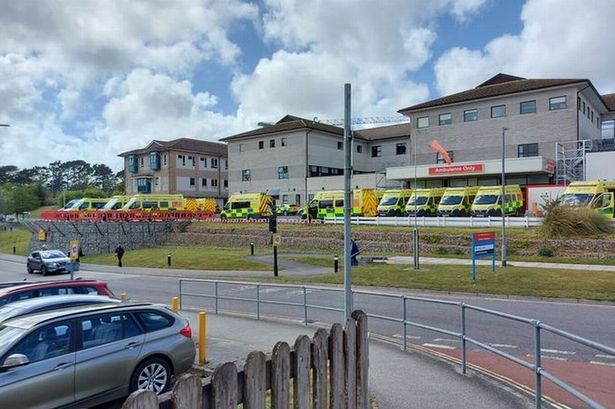The healthcare system in Cornwall, a picturesque county in southwest England, is currently grappling with an overwhelming surge in demand, forcing hospital administrators to declare a critical incident. This declaration signifies that the system is under such immense strain that its ability to deliver essential services is severely compromised, potentially jeopardizing patient safety. The situation is vividly illustrated by the alarming image of ambulances queuing outside the Royal Cornwall Hospital’s Accident and Emergency department, a stark visual representation of the capacity crisis gripping the region’s hospitals. This bottleneck signifies that patients requiring immediate medical attention are facing extended delays, unable to access timely care, and paramedics are tied up waiting to hand over patients, further depleting resources for other emergencies in the community.
Several factors contribute to this critical incident. The ongoing impact of the COVID-19 pandemic, although lessened in severity, continues to exert pressure on hospital resources. The virus itself necessitates dedicated isolation facilities and specialized care, while the lingering effects of long COVID contribute to a higher demand for ongoing medical services. Furthermore, the pandemic has exacerbated existing systemic challenges within the National Health Service (NHS), including staff shortages and bed capacity limitations. These pre-existing vulnerabilities, combined with the added strain of COVID-19, have created a perfect storm, pushing the Cornish healthcare system to the brink. The current surge in demand may also be attributed to seasonal factors, such as an increase in respiratory illnesses during the winter months, and the influx of tourists visiting Cornwall, especially during peak seasons, placing additional strain on local healthcare services.
The declaration of a critical incident triggers a series of emergency measures designed to mitigate the crisis and restore essential services. These measures typically involve the redeployment of staff, the postponement of non-urgent procedures, and the activation of mutual aid agreements with neighboring healthcare providers. Hospitals may also implement stricter visitor restrictions to minimize the risk of infection and free up staff for patient care. Furthermore, the critical incident declaration serves as a public appeal for cooperation and understanding. Residents are urged to utilize healthcare services judiciously, seeking alternatives like pharmacies and GP surgeries for non-emergency medical needs, thereby reserving emergency departments for those requiring immediate, life-saving interventions.
The long-term solutions to the pressures facing Cornwall’s hospitals and the wider NHS are complex and multifaceted. Addressing the chronic staff shortages requires a comprehensive strategy that includes recruitment and retention initiatives, improved working conditions, and investment in training and development programs. Expanding bed capacity and upgrading infrastructure are equally crucial to accommodate the growing demand for healthcare services. Furthermore, strengthening primary care services and community-based healthcare options can help alleviate the burden on hospitals by providing alternative avenues for non-emergency medical needs. This comprehensive approach involves investing in community clinics, expanding the role of pharmacists, and promoting preventative healthcare measures.
Beyond these immediate and long-term strategies, a fundamental shift in healthcare delivery is needed. This involves embracing innovative approaches like telemedicine and remote monitoring, which can improve access to care, particularly for patients in rural areas. These technologies allow patients to consult with healthcare professionals remotely, reducing the need for hospital visits and freeing up valuable resources. Furthermore, integrating health and social care services can facilitate a more holistic approach to patient care, addressing both medical and social needs, particularly for vulnerable populations. This integration aims to prevent hospital admissions and support timely discharges, easing the strain on hospital resources.
In conclusion, the critical incident declared in Cornwall serves as a stark reminder of the fragility of healthcare systems and the urgent need for comprehensive, long-term solutions. While emergency measures can provide temporary relief, addressing the root causes of the crisis requires a sustained commitment to investing in infrastructure, workforce development, and innovative models of care. The ongoing challenges facing the NHS highlight the importance of proactive planning, robust resource allocation, and a concerted effort to build a more resilient and sustainable healthcare system capable of meeting the evolving needs of the population. The situation in Cornwall underscores the need for a national conversation about the future of healthcare and the collective responsibility to ensure access to high-quality care for all.














